
Sohn Kee-chung was an Olympic athlete and long-distance runner. He became the first ethnic Korean to win a medal at the Olympic Games, winning gold in the marathon at the 1936 Berlin Olympics. He was a Korean national, but he had to compete as a member of the Japanese delegation because Korea was under Japanese occupation at the time. Sohn set an Olympic record of 2 hours 29 minutes 19.2 seconds.
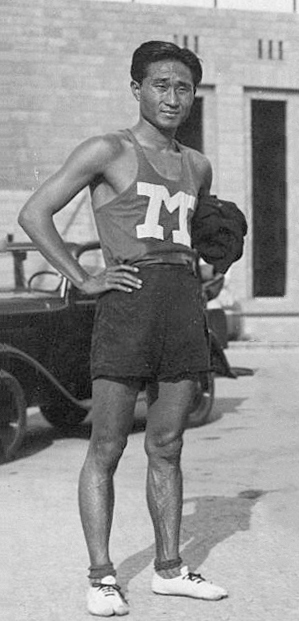
Nam Sung-yong was a Korean Olympian who won a bronze medal in the marathon at the 1936 Summer Olympics, completing the run in 2 hours, 31 minutes, and 42 seconds.
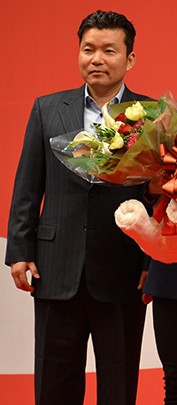
Hwang Young-cho is a former South Korean athlete, winner of the marathon race at the 1992 Summer Olympics and 1994 Asian Games.

The 1936 Summer Olympics, officially known as the Games of the XI Olympiad, was an international multi-sport event held in Berlin, Germany, from 1 August to 16 August.
At the 1936 Summer Olympics in Berlin, 29 athletics events were contested, 23 for men and 6 for women. The program of events was unchanged from the previous Games. There was a total of 776 participants from 43 countries competing.

The Empire of Japan competed at the 1936 Summer Olympics in Berlin, Germany. 179 athletes competed in 13 sports and also participated in art competitions. In art competitions, Japan won 2 bronze medals by Ryuji Fujita in paintings and also Sujaku Suzuki in drawing and water colours. As the country hosted the next Olympics that was supposed to be held Tokyo before cancellation, a Japanese segment was performed at the closing ceremony.

The Republic of Korea first participated at the Olympic Games in 1948, and has sent athletes to compete in every Summer Olympic Games since then, except for 1980 which they boycotted. South Korea has also participated in every Winter Olympic Games since 1948, except for the 1952 games.
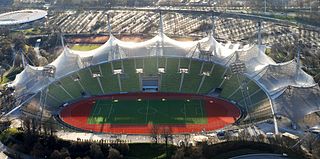
The men's marathon at the 1972 Summer Olympics in Munich, West Germany was held on Sunday September 10, 1972. The race started at 15:00h local time. There were 74 competitors from 39 countries. Twelve of them did not finish. The maximum number of athletes per nation had been set at 3 since the 1930 Olympic Congress. The event was won by Frank Shorter of the United States, the nation's first Olympic marathon victory since 1908 and third overall. Karel Lismont won Belgium's second medal in the marathon with his silver. Mamo Wolde of Ethiopia became only the second man, after his countryman Abebe Bikila, to win two medals in the marathon. Ethiopia's four-Games medal streak was matched only by Finland (1920–1932).

The men's marathon at the 1996 Summer Olympics in Atlanta was held on Sunday August 4, 1996. The race started at 07:05h local time to avoid excessively hot and humid conditions. A total number of 111 athletes completed the race, with an injured and limping Abdul Baser Wasiqi from Afghanistan finishing in last position in 4:24:17.

The men's marathon at the 1992 Summer Olympics in Barcelona, Spain, was held on Sunday August 9, 1992. The race started at 18:30h local time. One hundred and ten athletes from 72 nations started; 87 athletes completed the race, with Pyambuugiin Tuul from Mongolia finishing in last position in 4:00:44. The maximum number of athletes per nation had been set at 3 since the 1930 Olympic Congress. The event was won by Hwang Young-Cho of South Korea, the nation's first Olympic men's marathon medal. Koichi Morishita's silver was Japan's first medal in the event since 1968. Stephan Freigang of Germany took bronze, the first medal for Germany in the event though East Germany had won two golds during partition.

Suh Yun-bok was a South Korean marathoner, who is best known as the winner of the 1947 Boston Marathon.

Fusashige Suzuki was a Japanese long-distance runner who is credited by the International Association of Athletics Federations for setting a world record in the marathon on March 31, 1935.
Albert Richard "Whitey" Michelsen was an American long-distance runner who is recognized as having set a world's best in the marathon on October 12, 1925, with a time of 2:29:01 at the inaugural Port Chester Marathon in Port Chester, New York. According to the International Association of Athletics Federations, Michelsen held this record until Fusashige Suzuki posted a 2:27:49 performance in Tokyo, Japan on March 31, 1935.

Yasuo Ikenaka was a Japanese long-distance runner who is credited by the International Association of Athletics Federations for setting a world's best in the marathon on April 3, 1935. According to the IAAF, Ikenaka's time of 2:26:44 was over a minute faster than the previous record set by Fusashige Suzuki three days earlier.

The men's marathon event at the 1948 Summer Olympic Games took place on August 7. Forty-one athletes from 21 nations competed. The maximum number of athletes per nation had been set at 3 since the 1930 Olympic Congress. The race was won by Delfo Cabrera of Argentina, the nation's second victory in three Games. Tom Richards's silver medal put Great Britain on the podium for the third time in a row, while Étienne Gailly earned Belgium's first marathon medal with his bronze.
The Chuncheon International Marathon is an annual marathon race which is held in late October in the city of Chuncheon, South Korea. First held in 1946, it is the second oldest marathon in the country after the Seoul International Marathon. Sponsored by The Chosun Ilbo, a major daily newspaper in South Korea, the race is one of two in the country which holds IAAF Silver Label status, along with Gyeongju International Marathon.
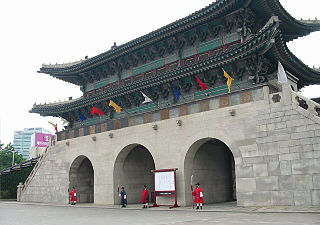
The Seoul International Marathon, also known as the Dong-A Ilbo Seoul Marathon or Seoul Marathon is an annual marathon race that takes place in Seoul, South Korea. It is one of two annual races over the 42.195 km classic distance in the city, alongside the JoongAng Seoul Marathon which is held in November. It holds World Athletics Platinum Label Road Race status. First held in 1931, it is the third longest-running road running competition in Asia after the Hakone Ekiden and Chugoku Yamaguchi Ekiden in Japan.
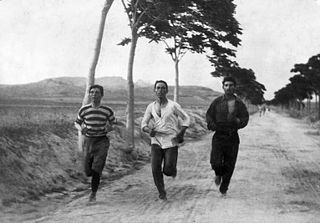
The marathon at the Summer Olympics is the only road running event held at the multi-sport event. The men's marathon has been present on the Olympic athletics programme since 1896. Nearly ninety years later, the women's event was added to the programme at the 1984 Olympics in Los Angeles.
Ludovic Gall was a Romanian long-distance runner. He competed in the marathon at the 1936 Summer Olympics where he finished on the 23rd place. He was the first Romanian athlete to complete a marathon run at the Olympic Games.
The closing ceremony of the 1984 Summer Olympics took place at the Los Angeles Memorial Coliseum in Los Angeles, California on Sunday, August 12, 1984, at 20:00 PDT.















